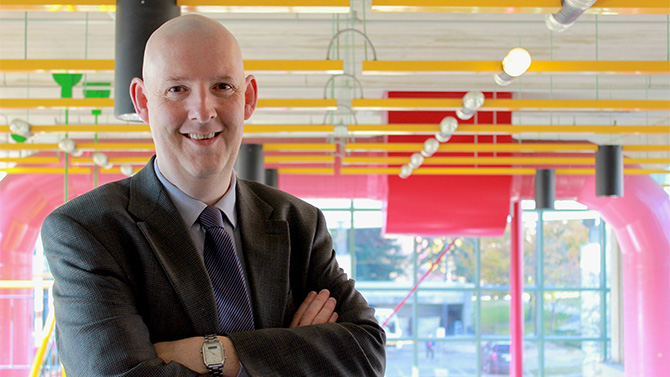


April 7: CIS Distinguished Lecture
February 20, 2017
University of Waterloo expert to deliver computer science distinguished lecture
Mark Giesbrecht, professor and director of the David R. Cheriton School of Computer Science at the University of Waterloo, will deliver a Computer and Information Sciences Distinguished Lecture at the University of Delaware on Friday, April 7.
The lecture, “Eigenvalues, Elimination and Random Integer Matrices, and Some Speculative Applications to Computing with Sparse Matrices,” will be held in Gore Recital Hall of the Roselle Center for the Arts from 10:30 a.m. to noon.
Lecture abstract
Integer matrices are typically characterized by the “lattice” of combinations of their rows or columns. This is captured nicely by the Smith canonical form, a diagonal matrix of “invariant factors” to which any integer matrix can be transformed through left and right multiplication by unimodular matrices.
But integer matrices can also be viewed as complex matrices, with eigenvalues and eigenvectors, and every such matrix is similar to a unique one in Jordan canonical form.
It would seem a priori that the invariant factors and the eigenvalues would have little to do with each other. Yet the talk will show that for “almost all” matrices the invariant factors and the eigenvalues are equal under a p-adic valuation in a very precise sense. A much-hoped-for link is explored for fast computation of Smith forms of sparse integer matrices, via the better understood algorithms for computing eigenvalues. All the methods are elementary, and no particular background beyond linear algebra will be assumed.
Speaker biography
Mark Giesbrecht is professor and director of the David R. Cheriton School of Computer Science at the University of Waterloo. He received a bachelor of science degree from the University of British Columbia in 1986, and a doctorate from the University of Toronto in 1993.
He is an ACM distinguished scientist and former chair of ACM SIGSAM (Special Interest Group on Symbolic and Algebraic Manipulation) and the International Symposium on Symbolic and Algebraic Computation (ISSAC) Steering Committees, as well as serving as ISSAC program committee chair. His research interests are in symbolic computation and computer algebra, as well as computational linear algebra.
Contact Us
Have a UDaily story idea?
Contact us at ocm@udel.edu
Members of the press
Contact us at mediarelations@udel.edu or visit the Media Relations website

